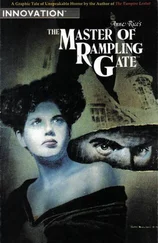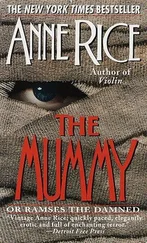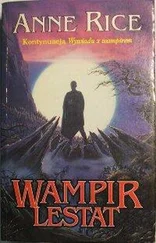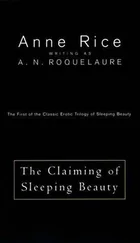Anne Rice - The Vampire Lestat
Здесь есть возможность читать онлайн «Anne Rice - The Vampire Lestat» весь текст электронной книги совершенно бесплатно (целиком полную версию без сокращений). В некоторых случаях можно слушать аудио, скачать через торрент в формате fb2 и присутствует краткое содержание. Жанр: Ужасы и Мистика, на английском языке. Описание произведения, (предисловие) а так же отзывы посетителей доступны на портале библиотеки ЛибКат.
- Название:The Vampire Lestat
- Автор:
- Жанр:
- Год:неизвестен
- ISBN:нет данных
- Рейтинг книги:5 / 5. Голосов: 1
-
Избранное:Добавить в избранное
- Отзывы:
-
Ваша оценка:
- 100
- 1
- 2
- 3
- 4
- 5
The Vampire Lestat: краткое содержание, описание и аннотация
Предлагаем к чтению аннотацию, описание, краткое содержание или предисловие (зависит от того, что написал сам автор книги «The Vampire Lestat»). Если вы не нашли необходимую информацию о книге — напишите в комментариях, мы постараемся отыскать её.
The Vampire Lestat — читать онлайн бесплатно полную книгу (весь текст) целиком
Ниже представлен текст книги, разбитый по страницам. Система сохранения места последней прочитанной страницы, позволяет с удобством читать онлайн бесплатно книгу «The Vampire Lestat», без необходимости каждый раз заново искать на чём Вы остановились. Поставьте закладку, и сможете в любой момент перейти на страницу, на которой закончили чтение.
Интервал:
Закладка:
"I can't! " I said miserably.
"I love you for it, " she said. "It's all too like you that you should see this in a tiny bedroom in the inn late at night when you're drinking wine. And it's entirely like you to rage against it the way you rage against everything else. " I started to cry again though I knew she wasn't condemning me. And then she took out a handkerchief and opened it to reveal several gold coins.
"You'll get over this, " she said. "For the moment, death is spoiling life for you, that's all. But life is more important than death. You'll realize it soon enough. Now listen to what I have to say. I've had the doctor here and the old woman in the village who knows more about healing than he knows. Both agree with me I won't live too long. "
"Stop, Mother, " I said, aware of how selfish I was being, but unable to hold back. "And this time there'll be no gifts. Put the money away.
"Sit down, " she said. She pointed to the bench near the hearth. Reluctantly I did as I was told. She sat beside me.
"I know, " she said, "that you and Nicolas are talking of running away. "
"I won't go, Mother. . . "
"What, until I'm dead? " I didn't answer her. I can't convey to you the frame of mind. I was still raw, trembling, and we had to talk about the fact that this living, breathing woman was going to stop living and breathing and start to putrefy and rot away, that her soul would spin into an abyss, that everything she had suffered in life, including the end of it, would come to nothing at all. Her little face was like something painted on a veil. And from the distant village came the thinnest sound of the singing villagers.
"I want you to go to Paris, Lestat, " she said. "I want you to take this money, which is all I have left from my family. I want to know you're in Paris, Lestat, when my-time comes. I want to die knowing you are in Paris. " I was startled. I remembered her stricken expression years ago when they'd brought me back from the Italian troupe. I looked at her for a long moment. She sounded almost angry in her persuasiveness.
"I'm terrified of dying, " she said. Her voice went almost dry. "And I swear I will go mad if I don't know you're in Paris and you're free when it finally comes. " I questioned her with my eyes. I was asking her with my eyes, "Do you really mean this? "
"I have kept you here as surely as your father has, " she said. "Not on account of pride, but on account of selfishness. And now I'm going to atone for it. I'll see you go. And I don't care what you do when you reach Paris, whether you sing while Nicolas plays the violin, or turn somersaults on the stage at the St. Germain Fair. But go, and do what you will do as best you can. " I tried to take her in my arms. She stiffened at first but then I felt her weaken and she melted against me, and she gave herself over so completely to me in that moment that I think I understood why she had always been so restrained. She cried, which I'd never heard her do. And I loved this moment for all its pain. I was ashamed of loving it, but I wouldn't let her go. I held her tightly, and maybe kissed her for all the times she'd never let me do it. We seemed for the moment like two parts of the same thing. And then she grew calm. She seemed to settle into herself, and slowly but very firmly she released me and pushed me away. She talked for a long time. She said things I didn't understand then, about how when she would see me riding out to hunt, she felt some wondrous pleasure in it, and she felt that same pleasure when I angered everyone and thundered my questions at my father and brothers as to why we had to live the way we lived. She spoke in an almost eerie way of my being a secret part of her anatomy, of my being the organ for her which women do not really have.
"You are the man in me, " she said. "And so I've kept you here, afraid of living without you, and maybe now in sending you away, I am only doing what I have done before. " She shocked me a little. I never thought a woman could feel or articulate anything quite like this.
"Nicolas's father knows about your plans, " she said. "The innkeeper overheard you. It's important you leave right away. Take the diligence at dawn, and write to me as soon as you reach Paris. There are letter writers at the cemetery of les Innocents near the St. Germain Market. Find one who can write Italian for you. And then no one will be able to read the letter but me. " When she left the room, I didn't quite believe what had happened. For a long moment I stood staring before me. I stared at my bed with its mattress of straw, at the two coats I owned and the red cloak, and my one pair of leather shoes by the hearth. I stared out the narrow slit of a window at the black hulk of the mountains I'd known all my life. The darkness, the gloom, slid back from me for a precious moment. And then I was rushing down the stairs and down the mountain to the village to find Nicolas and to tell him we were going to Paris! We were going to do it. Nothing could stop us this time. He was with his family watching the bonfire. And as soon as he saw me, he threw his arm around my neck, and I hooked my arm around his waist and I dragged him away from the crowds and the blaze, and towards the end of the meadow. The air smelled fresh and green as it does only in spring. Even the villagers' singing didn't sound so horrible. I started dancing around in a circle.
"Get your violin! " I said. "Play a song about going to Paris, we're on our way. We're going in the morning! "
"And how are we going to feed ourselves in Paris? " he sang out as he made with his empty hands to play an invisible violin. "Are you going to shoot rats for our supper? "
"Don't ask what we'll do when we get there! " I said. "The important thing is just to get there. "
7
Not even a fortnight passed before I stood in the midst of the noonday crowds in the vast public cemetery of les Innocents, with its old vaults and stinking open graves-the most fantastical marketplace I had ever beheld-and, amid the stench and the noise, bent over an Italian letter writer dictating my first letter to my mother. Yes, we had arrived safely after traveling day and night, and we had rooms in the lie de la Cite, and we were inexpressibly happy, and Paris was warm and beautiful and magnificent beyond all imagining. I wished I could have taken the pen myself and written to her. I wished I could have told her what it was like, seeing these towering mansions, ancient winding streets aswarm with beggars, peddlers, noblemen, houses of four and five stories banking the crowded boulevards. I wished I could have described the carriages to her, the rumbling confections of gilt and glass bullying their way over the Pont Neuf and the Pont Notre Dame, streaming past the Louvre, the Palais Royal. I wished I could describe the people, the gentlemen with their clocked stockings and silver walking sticks, tripping through the mud in pastel slippers, the ladies with their pearl- encrusted wigs and swaying panniers of silk and muslin, my first certain glimpse of Queen Marie Antoinette herself walking boldly through the gardens of the Tuileries. Of course she'd seen it all years and years before I was born. She'd lived in Naples and London and Rome with her father. But I wanted to tell her what she had given to me, how it was to hear the choir in Notre Dame, to push into the jam-packed cafes with Nicolas, talk with his old student cronies over English coffee, what it was like to get dressed up in Nicolas's fine clothes-he made me do it-and stand below the footlights at the Comedie-Francaise gazing up in adoration at the actors on the stage. But all I wrote in this letter was perhaps the very best of it, the address of the garret rims we called our home in the lie de la Cite, and the news:
"I have been hired in a real theater to study as an actor with a fine prospect of performing very soon. " What I didn't tell her was that we had to walk up six flights of stairs to our rooms, that men and women brawled and screamed in the alleyways beneath our windows, that we had run out of money already, thanks to my dragging us to every opera, ballet, and drama in town. And that the establishment where I worked was a shabby little boulevard theater, one step up from a platform at the fair, and my jobs were to help the players dress, sell tickets, sweep up, and throw out the troublemakers. But I was in paradise again. And so was Nicolas though no decent orchestra in the city would hire him, and he was now playing solos with the little bunch of musicians in the theater where I worked, and when we were really pinched he did play right on the boulevard, with me beside him, holding out the hat. We were shameless! We ran up the steps each night with our bottle of cheap wine and a loaf of fine sweet Parisian bread, which was ambrosia after what we'd eaten in the Auvergne.
Читать дальшеИнтервал:
Закладка:
Похожие книги на «The Vampire Lestat»
Представляем Вашему вниманию похожие книги на «The Vampire Lestat» списком для выбора. Мы отобрали схожую по названию и смыслу литературу в надежде предоставить читателям больше вариантов отыскать новые, интересные, ещё непрочитанные произведения.
Обсуждение, отзывы о книге «The Vampire Lestat» и просто собственные мнения читателей. Оставьте ваши комментарии, напишите, что Вы думаете о произведении, его смысле или главных героях. Укажите что конкретно понравилось, а что нет, и почему Вы так считаете.









